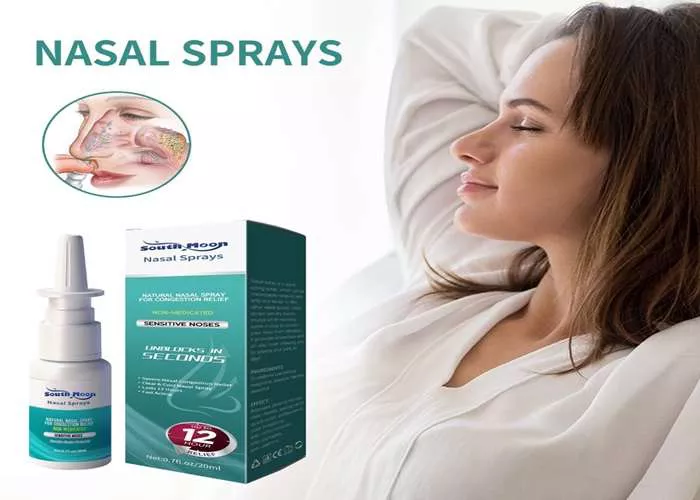A runny nose can be a frustrating and disruptive symptom, especially when it persists for extended periods. Whether caused by allergies, the common cold, or environmental irritants, finding the right nasal spray to dry up a runny nose can significantly improve your quality of life. This article will explore the best over-the-counter (OTC) nasal sprays for managing a runny nose, their mechanisms of action, safety profiles, and suitability for long-term use.
Understanding a Runny Nose
A runny nose, medically known as rhinorrhea, occurs when the nasal passages produce excessive mucus. This condition can be caused by viral infections, allergies, environmental irritants, or changes in temperature. Common symptoms include nasal congestion, sneezing, and a constant need to blow your nose. Effective management often involves using nasal sprays that target the underlying causes of these symptoms.
8 Types of Nasal Sprays for a Runny Nose
There are several types of nasal sprays available, each with its own benefits and drawbacks. The choice of nasal spray depends on the severity of symptoms and personal preferences.
Saline Nasal Sprays
Saline nasal sprays are a simple and effective way to manage a runny nose. They work by rinsing away irritants and thinning mucus, making it easier to clear the nasal passages.
Form:Nasal spray or drops
Effectiveness:Helps to cleanse the nasal passages and reduce mucus production.
Safety:Generally safe for both adults and children.
Best For:People with mild symptoms or those who prefer a non-medicated option.
Steroid Nasal Sprays
Steroid nasal sprays are highly effective in reducing inflammation and congestion in the nasal passages. They are often the first line of treatment for allergies and can provide long-term relief.
Fluticasone (Flonase Allergy Relief)
Form:Nasal spray
Effectiveness:Highly effective in reducing sneezing, runny nose, and nasal congestion.
Safety:Generally safe for long-term use. Side effects may include nosebleeds, headache, and sore throat.
Best For:People with moderate to severe allergy symptoms who need long-term relief.
Triamcinolone (Nasacort Allergy 24HR)
Form:Nasal spray
Effectiveness:Effective in managing sneezing and other allergy symptoms.
Safety:Generally safe with minimal side effects. May cause nasal irritation.
Best For:People with moderate to severe allergy symptoms.
Antihistamine Nasal Sprays
Antihistamine nasal sprays work by blocking histamine, a chemical released during an allergic reaction. They provide quick relief from sneezing and itching.
Azelastine (Astepro)
Form:Nasal spray
Effectiveness:Provides rapid relief from sneezing, runny nose, and nasal congestion.
Safety:Generally well-tolerated but may cause a bitter taste, headache, or nasal irritation.
Best For:People who need quick relief from sneezing and itching.
Olopatadine (Patanase)
Form:Nasal spray
Effectiveness:Effective in managing sneezing and other allergy symptoms.
Safety:Generally safe with minimal side effects.
Best For:People with moderate to severe allergy symptoms.
Decongestant Nasal Sprays
Decongestant nasal sprays provide rapid relief from nasal congestion by reducing swelling in the nasal passages. However, they should not be used for more than three days to avoid rebound congestion.
Oxymetazoline (Afrin)
Form:Nasal spray
Effectiveness:Provides quick relief from nasal congestion and a runny nose.
Safety:Should not be used for more than 2-3 days to avoid rebound congestion.
Best For:Short-term relief from severe nasal congestion.
Phenylephrine (Neo-Synephrine)
Form:Nasal spray
Effectiveness:Effective in reducing nasal congestion and a runny nose.
Safety:Should not be used for more than 2-3 days to avoid rebound congestion.
Best For:Short-term relief from severe nasal congestion.
Mast Cell Stabilizers
Mast cell stabilizers prevent the release of histamine and other inflammatory mediators, reducing allergy symptoms.
Cromolyn Sodium (Nasalcrom)
Form:Nasal spray
Effectiveness:Effective in preventing sneezing and runny nose when used regularly.
Safety:Generally safe but may require several days to produce full effect.
Best For:People with mild to moderate allergy symptoms who can start using the spray before allergy season begins.
Conclusion
Managing a runny nose effectively requires the right choice of nasal spray based on your specific symptoms and needs. Saline nasal sprays provide a gentle and effective solution for rinsing away irritants and thinning mucus. Steroid nasal sprays like fluticasone and triamcinolone are highly effective for reducing inflammation and congestion. Antihistamine nasal sprays like azelastine and olopatadine offer rapid relief from sneezing and itching. Decongestant nasal sprays like oxymetazoline and phenylephrine provide quick relief but should be used short-term. Mast cell stabilizers like cromolyn sodium are effective for preventing symptoms when used regularly. Always consult with a healthcare provider to determine the best treatment plan for your specific needs. With the right approach, you can manage your runny nose and improve your overall comfort.
Relative topics:
What’s the 6 Strongest OTC Antihistamine Hives
Beach Allergies: Causes, Symptoms, Treatment & Prevention
Can Allergies Increase Your Heart Rate?

